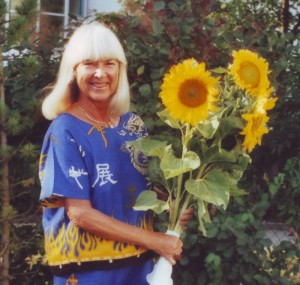Voluntary engagement in Tanzania
The interview with Heide Schanz was conducted by Hannelore Bürgers, ViLE e.V., Germany
1. What is/was your Motivation?
First of all: Throughout my life, I was always active as a volunteer for different institutions and organisations; e.g. class spokesman, Lutheran Youth Group, German Alpine Club etc.
The motivation for my actual commitment for an Education Centre in Northern Tanzania however simply emerged after my retirement in 1998 from the intention to do something beneficiary for people who are by far not as lucky as I am and also to avoid boredom and depressions.
My best School Mate became a missionary in Tanzania where he founded a Vocational Training Centre in the 1970th. This School was close to be given up because of lack of money and lack of capable teachers just in 1998. Thus, I understood the hint of God and decided to jump into this adventurous project.
2. Are there any links to your former profession or occupation?
No really! But due to my former job which made me travelling around the world and brought me in close contact with other cultures, I felt being able to do the right thing. As well, I am not so bad in organization and had some good contacts to possible donors.
3. What are the highlights or frustrations in your voluntary occupation?
Highlights: The overwhelming gratitude shown by the scholarship students from very poor families for which I collected the money for their education. Of course, too, the very close contact with a very different culture and the excursions to the famous and unique Natl. Parks including hiking the Mountains Kilimanjaro, Meru and Oldonyo Lengai (volcano).
Frustrations: Constant lack of funds to help the School more efficiently. The bitter experience that the projects are progressing only very slowly and, due to their local culture, in a somehow different way.
4. Are there any changes in your life due to your commitment?
Not really besides the fact that my commitment is a very time consuming one. But of course it is very satisfying to do something meaningful for the benefit of really needy children.
5. Is there any change in your opinion towards honorary posts due to your commitment?
No, because I always did it.
6. Is there anything you want to change in your voluntary job?
Regarding the task, no. But getting older and older, I am eagerly looking for someone capable to become my successor!
7. Are there any changes regarding your social milieu?
Yes, substantially! In order to implement the job in the right way, I had to build up a tremendous lot of contacts with other NGOs in Germany and in Tanzania and to search for donors outside and within my existing social contacts.
8. How much time takes your job?
A lot of, really! At the beginning 50 – 60 hours per week; now about 20 – 30 hours per week. Additionally 2 -4 trips per year within Germany and 1 -2 trips per year to Tanzania.
9. Is your commitment a heavy burden to you?
Yes! But it is a positive stress and, as said above, it is a very time consuming task. Besides this, it is a quite substantial monetary strain: between 1.000 and more than 2000 Euro per year to be paid from my own pocket.
10. What kind of support you would like to get from the public and the politics?
This is a very complex question and would need a quite detailed answer.
Let me say in short the following: The German Government is paying billions of Euros to many countries around the world. Most of this money goes to the budgets of the governments and thus, by definition, partly into the pockets of corrupt politicians. Of course, Mr. Niebel and his newly formed consolidated GEZ are sponsoring relief projects from big NGOs or other big organisations with a lot of bureaucracy, but smaller organisations like AKO with just 650 members, hardly get a chance to get money for their grass root activities (which are the most efficient ones).


 May 17, 2011
May 17, 2011 

No comments yet... Be the first to leave a reply!